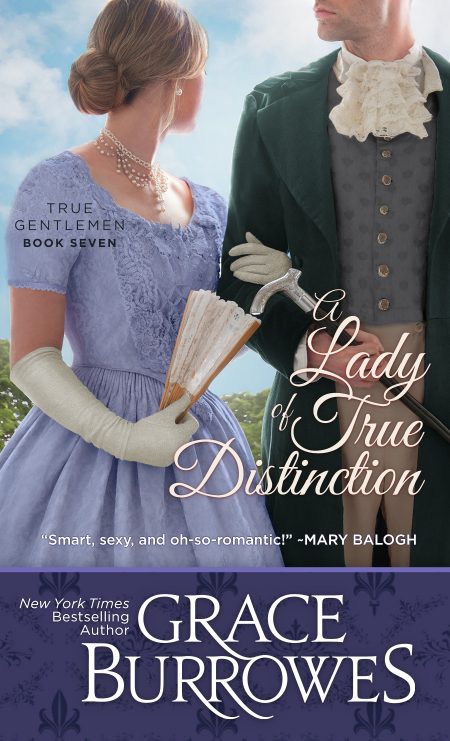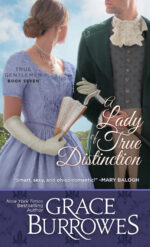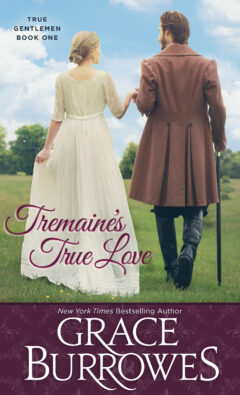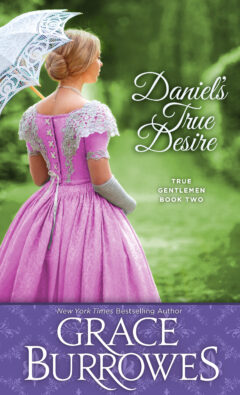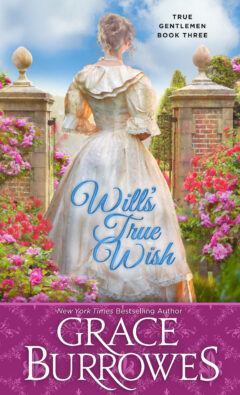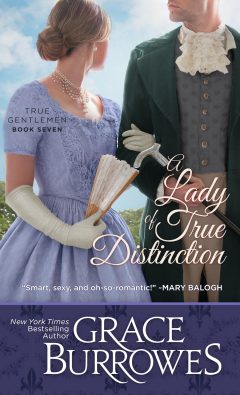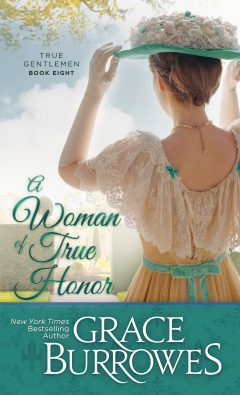A Lady of True Distinction
Book 7 in the True Gentlemen series
Hawthorne Dorning either finds a way to turn his family’s vast botanical resources into a successful commercial venture, or the estate the Dornings have called home for centuries could be broken up. He loves the land and he’s never shied away from hard work, but he knows nothing about creating perfumes or fragrances.
Margaret Summerfield has put aside her passion for scent-making to tend to the serious business of raising her little nieces. She’s no longer the girl who wandered the countryside by the hour, lost in the pleasures of nature, nor does she want to be. Hawthorne needs her help, but what does he have that could possibly tempt Margaret to entangle herself with his dreams?
Enjoy An Excerpt







Chapter One
“Hawthorne, be reasonable. I know you dislike Mrs. Summerfield, so please allow me to pay this call with you.”
Hawthorne Dorning continued walking toward the mounting block rather than do violence to a brother who meant well. “To dislike a woman who has never done me any harm would be ungentlemanly. Shame upon you, Valerian, for implying such a thing.” Moreover, Valerian was wrong, not that Hawthorne had time to correct him.
Valerian kept pace easily, though Thorne was two inches taller. “Since your distant and misspent youth, have you ever once stood up with the lady at a local assembly?”
“I have not.” Thorne had watched, though, as Margaret Summerfield had stood up with his brothers and half of his neighbors. She was neither a coquette nor a snob, and she moved with an easy grace on the dance floor.
“Have you ever been seated beside her at the interminable dinners that pass for socializing in these bucolic surrounds?”
“Again, no.” But then, Thorne excelled at avoiding invitations to those dinners.
“Have you tarried with Mrs. Summerfield in the churchyard, flirting discreetly while you pretend to discuss the weather and the crops?”
Thorne had stood in the churchyard many a fine morning, enjoying small talk while from the corner of his eye watching Margaret hurry her nieces into a waiting coach.
“I do not flirt, discreetly or otherwise.”
A groom stood at Gowain’s head, though the gelding would have napped in the spring sunshine all day.
Valerian snorted, which inspired something like an equine frown from Thorne’s gelding. “What do you call it, then, when you smile knowingly at a young lady, lean near her, and nearly whisper confidences that cause her to blush and giggle?”
“I cannot help that my attempts at conversation are more discreet than yours or Oak’s.” Thorne checked the snugness of the girth, because Gowain loved nothing better than to hold his breath while being saddled. When the horse exhaled, the girth was looser than safety required, which afforded an enterprising steed all manner of opportunities.
“We’re on to his tricks, Master Hawthorne,” the groom said, stroking Gowain’s big russet nose. “He likes to keep us on our toes, does Sir Gowain.”
“Captain!” Thorne yelled, which had the dog on his feet and trotting across the drive as Thorne swung into the saddle.
“You’re taking your hound calling with you, but not your most charming brother?” Valerian asked.
“Captain needs the exercise, or he’ll chew more slippers to bits, while you can at least be trusted around my footwear—for the most part.” Thorne took up the reins and turned the horse down the drive. “Don’t wait luncheon for me.”
“I wasn’t about to. Please give the lady my regards. She’s not that bad, once you get to know her.”
“If I got to know her, she’d have to get to know me, and I very much doubt Mrs. Summerfield is interested in that challenge.” She’d never said as much, but Thorne had concluded long ago that his interest in Margaret Summerfield was unreciprocated. He’d consigned his fancies to the category of youthful infatuation and not looked back.
Thorne cantered down the drive, Captain bounding at Gowain’s heels. In the interests of concluding this task as quickly as possible, he cut across the fields rather than taking the lanes to the Mrs. Summerfield’s estate. The eastern boundary between Dorning Hall and the Summerfield property was a stream that, on his best day, Gowain could not clear in a single leap. He nonetheless tried, creating a great splash and much thrashing about as he landed short of the far bank.
“You never make that jump,” Thorne said when they’d scrambled up the bank. “Why must you insist on doomed bravado? Your behavior is foolish and unbecoming, horse, and one of these days you’ll regret your histrionics.”
Gowain, of course, shook like a dog when he reached solid footing, then trotted on as if only rider miscalculation had resulted in the indignity of mud on a fellow’s fetlocks. Captain chose to tarry in the stream, resulting in a very wet dog following Thorne onto the Summerfield front steps.
“You stink,” Thorne said, waving his riding crop. “Go away.”
Captain wagged a sopping tail and looked expectantly at the front door.
“Get thee gone, beast. You are not presentable.”
The front door opened, and where a smiling butler or cheerful housekeeper should have stood, Thorne beheld Mrs. Margaret Summerfield.
“Mr. Dorning. Good day.” A small hesitation followed that greeting, then she stepped back. “Do come in. Dog, you will wait here.”
Captain sat, his gaze crestfallen.
“His name is Captain. We came by way of the stream, and he indulged in a swim.” As if any female cared one whit what a smelly dog got up to when loose in the countryside.
“Hammond,” Mrs. Summerfield said as a footman took Thorne’s hat, spurs, and riding crop. “Have some water brought for Mr. Dorning’s friend, and if Cook has a bone, that would likely also be appreciated. Mr. Dorning, I’m in the blue parlor at the moment. My nieces are exploring the Asian steppes in the green parlor.”
She marched off, and even the brisk tattoo of her heels radiated impatience with her caller. Nothing about Margaret Summerfield was silly or insubstantial. Her features were angular, her brows darker than her blond hair and dramatically swooping. She moved with purpose rather than grace, and Thorne could not recall her smiling in his direction since she’d worn pigtails.
If even then.
Her house, by contrast, bore the welcoming scents of beeswax and lemon oil, the signature fragrance of a well-maintained abode. Here, though, an undernote of something—spearmint? cedar? Thorne could not decipher the olfactory subtlety—added an extra touch of freshness.
The manor smelled of sunshine and joy, while the lady of the house marched along like an artillery sergeant anticipating rain before a battle.
“Do we attempt conversation over a tea tray,” she said, “or will you state your business and gallop on your way?” She opened the door to a parlor done up in various shades of azure, cream, and gold. The room was light and airy, and the daffodils on the sideboard a pretty complement to the color scheme. The entire drive was lined with blossoming red, white, and yellow tulips, and more daffodils had graced the sideboard in the foyer.
“What makes you think I come on business, Mrs. Summerfield?”
She took a sniff of the flowers. “You last presented yourself in my parlor when you wanted to discuss damming the stream to create a water meadow. Before that, you broached the idea of trading rams to improve the quality of your wool. Prior to that, you sought to breed a mare to my stallion. Business, Mr. Dorning, and here you are again.”
On the most pressing business of all.
“I do have a proposition for you,” Thorne said. “A business proposition. Might we be seated?”
His request occasioned another small hesitation, as if his hostess had to consider whether allowing him a seat was truly necessary.
“By all means, make yourself comfortable.”
Something thumped against the inside wall, followed by a muffled shriek. “Has warfare broken out on the Asian steppes?”
“Very likely. If I am not vigilant, they will soon try to sneak their ponies into the library.”
“My siblings and I had better luck secreting our cavalry mounts in the conservatory, but then, Papa was usually distracted by his latest botanical experiment, and Mama was invariably out socializing.”
Mrs. Summerfield took a wing chair, but such was the authority with which she settled onto the cushion, that Thorne was put in mind of a queen assuming her throne. She was not a small woman, neither was she slender.
They might have danced well together, had he the fortitude to request such an honor.
Another thump sounded through the wall, while the lady remained unruffled.
“There were rather a lot of you for your parents to keep track of,” she observed. “I have only the two nieces to manage, and they often defeat my best efforts. What brings you here, Mr. Dorning?”
She wasn’t ringing for a tea tray, a small mercy.
“Nine children are a lot,” he said, “especially when seven of them are male. Now, we brothers must all find our way in the world, though Dorning Hall is essentially a glorified farm.”
“Very glorified. Between tenancies, the home farm, and other properties, the Dornings must own thousands of acres.”
She traced a seam on the armrest of the chair. The upholstery was a pattern of cabbage roses rioting amid swirling greenery, while the carpet was a pastel blue reminiscent of a still pond under a summer sky. Had the brisk, businesslike Mrs. Summerfield designed this pretty room, or were the appointments a relic of some predecessor’s good taste?
“The Dornings are the largest landowners in the area,” Thorne said. “We are far from the wealthiest.”
Her hand went still. “One wondered if you’d rebuild your dower house.”
The dower house had been struck by lightning during one of Dorset’s more spectacular autumn storms. Rebuilding was out of the question.
“We are salvaging what we can, but the fire did a thorough job on the beams and the interior. The family is turnings our sights in other directions.”
A thunder of footfalls from the next room suggested six infantry regiments, rather than a pair of little girls, were at war.
“How do those new directions bring you to my doorstep, Mr. Dorning?”
“I am here more or less as a supplicant, a neighbor in need.” He’d rehearsed this speech for half the night, convincing himself the words would sound amused if not charming. “The Dornings are embarking on a new venture, converting our botanical riches into commercial products. Lord Casriel conceived this enterprise. We brothers are to carry it out. As the closest thing to a land steward that Dorning Hall has, care of the actual fields and plants falls to me.”
“I wish you the joy of that undertaking, Mr. Dorning. Your father certainly bequeathed you a wealth of specimens to support your endeavor.”
Every English manor had gardens for herbs, medicinals, and fragrances. The more ambitious had color gardens, scent gardens, glass houses, walled gardens for kitchen produce, conservatories to preserve tender specimens during cold weather, and exotics for additional cachet.
Dorning Hall’s botanical resources were enormous and varied, true enough. Fat lot of good that had done anybody for the past thirty years. Mama had despaired of Papa’s compulsion to collect plants, and yet, Papa had gone on collecting just as Mama had gone on having babies.
“Competing with the London shops will be difficult,” Thorne said, veering away from his prepared remarks. “My brothers fail to grasp how difficult.”
“You will need capital.”
He rose, better able to think on his feet. “Most assuredly, and it’s not as if the Dornings enjoy an intimate acquaintance with the London markets, the London banks, or the London public.”
Mrs. Summerfield remained serenely situated in her chair. “And you think I am?”
She made an occasional foray into London. Nobody in this corner of Dorset could undertake travel without every neighbor wishing them a safe journey.
“I think you are the best-smelling woman I have ever sniffed.”
He’d surprised—and mortified—himself with that admission, but he’d apparently surprised her too.
“Thank you, I think, though as an acting steward, you are more likely to encounter the scent of a hog wallow than damask roses. What exactly is it you’ve come here to ask me, Mr. Dorning?”
“I don’t go around sniffing women,” he said, pausing by the daffodils. “But your fragrances have captured my attention. I can close my eyes and know if you’re among the congregation on Sunday morning on the strength of your perfumes.”
“And here we thought you were napping.”
Sometimes he dozed, soothed by the scent of her in the next pew behind him. “You are as likely to arrive at the village fete wearing something lemony as you are wearing a sandalwood scent, and both will be exquisite. I cannot predict what perfume you will choose, but your selections are like different signatures written in the same hand. I know them to be yours without knowing how I know them to be yours.”
Now she got to her feet. “I am flattered, Mr. Dorning. The word exquisite has probably never been applied to anything about me, though I fail to see—”
“Somebody on this estate is a genius at developing scents,” Thorne said, facing her. “Somebody has a combination of skill and artistic insight that eclipses any olfactory talent I have ever encountered. I want to hire that person.”
This time when she hesitated, she didn’t appear to be consulting an inner sense of etiquette to determine which courtesy the moment required, but rather, she appeared flustered—intriguingly flustered.
“I am sorry, Mr. Dorning. While your comments are flattering, and I agree with you—the scents I wear are unique—I am not in a position to grant your request. I’ll show you out.”
No, you will not. “My brothers believe any old lotion or salve will sell, provided Oak can design a pretty label for it. They believe all lavenders are the same.”
“All lavenders are different,” she retorted. “The same parent plant will produce different fragrances in its offspring, depending on the conditions where they are cultivated. Rainfall, sunshine, the soil quality, density of planting, even the crop that last occupied the same plot can affect results.”
“Did your herbalist teach you that?”
They were face-to-face, and though Thorne did not go around sniffing women in the usual course, he did inhale through his nose: jasmine hiding under a veil of neroli with a hint of green tea, but the rest of it…
“I again wish you well, Mr. Dorning, but I am not in a position to assist you.”
“I will beg, if you require that indignity of me.” More unrehearsed foolishness, though for his family, Thorne would make a fool of himself ten times over. “Who blends your scents, and what must I do to gain access to his or her expertise?”
God, she smelled wonderful. Distractingly, maddeningly wonderful, though her gaze offered no quarter.
“I cannot assist you. I’ll see you to the—”
A loud crash, suggesting porcelain dropped from a great height, came from the next room along with a shout.
“Aunt Margaret, come! Please come quickly!”
Thorne was out the door three steps ahead of the lady, who followed at an indecorous dash.
***
Please let them be unharmed alternated in Margaret’s mind with Why must the children create havoc now? When she crowded past Mr. Dorning into the family parlor, her lament switched to I will kill them ere they gain their majorities.
“What is going on here?” she snapped.
“I’d say”—Mr. Dorning sauntered over to the glass-fronted porcelain cabinet—“somebody’s army sought a good vantage point from which to ambush advancing forces. Is that what you’re doing up there?”
A white-faced Greta peered down at him from the top of the cabinet. “I’m a t-tiger of the vast Asian steppes.”
“You are a girl who will go without supper tonight,” Margaret said. “That vase belonged to your Grandmother Summerfield.”
The vase, which had been stored atop the cabinet for safety, lay in pieces on the hearth.
“Better the vase than a child’s skull,” Mr. Dorning said, as if children routinely climbed seven-foot-tall furniture unassisted. “How did you get up there?”
“She climbed the doorjamb,” Andrea said. “I gave her a boost.”
“Loyal of you,” Mr. Dorning observed, holding up his arms. “Down you go, child.”
Greta shrank back against the wall as if she were in truth a distressed wild creature. “I can’t.”
“You cannot spend the rest of your life atop the furniture, my girl.” He swept a graceful bow. “Mr. Hawthorne Dorning, at your service. I occupy myself clearing ditches, laying hedges, stacking hay, riding the fields, and am otherwise engaged in manual labor. That must be our secret, for as an earl’s son, I’m supposed to be a gentleman. The result, though, is that I am quite strong enough to get you safely down.”
The effect of this odd speech—the longest Margaret had ever heard from Hawthorne Dorning—was to catch Greta’s attention.
“Hawthorne is a funny name. I’m Greta.”
“What you are is stuck, young lady.” The situation seemed to amuse Mr. Dorning.
“You could have broken your neck,” Andrea said, just as Margaret thought the same words. Andrea took Margaret’s hand. “I told you not to climb that high.”
“Ah, but you did give your sister a boost,” Mr. Dorning said. “Perhaps you will assist her to clean up the mess, once we get her down from her aerie.”
Margaret’s heart was thumping, her mouth had gone dry, and she was on the verge of summoning footmen—though what could they do?—when Mr. Dorning held up his arms again.
“Down you go, Miss Greta. Now. I promise not to drop you.”
He knew how to blend a casual assumption of obedience with a comforting hint of amusement. Plucking children from dangerous heights was just another chore to be tended to, along with the ditches, hedges, and tenant calls. He did not, however, know the lengths Greta went to avoid contact with strangers.
The girl sat up, so her stockinged feet dangled down the front of the cabinet and her head nearly touched the molding. Mr. Dorning put his hands on her waist—gracious, he was tall—and then he hefted Greta to his hip, stepping free of the shattered vase.
“The next order of business,” he said, tapping Greta’s nose with one gentle finger, “is an apology to your aunt. You gave her a fright.”
Greta stared at the floor. She darted a glance at Andrea. She gazed up at the top of the breakfront. She remained snuggled against her rescuer, when Margaret had been certain Greta would scramble free at the first opportunity.
“I should not have climbed on the furniture… again.” She rested her head against Mr. Dorning’s shoulder. “I am sorry.”
What am I to do with you? Margaret had asked that question any number of times. She wasn’t about to ask it while Mr. Dorning toed through shattered porcelain.
“Both of you wait for me in the schoolroom,” she said as Mr. Dorning set Greta on her feet well clear of the wreckage. “We’ll discuss this later.”
The girls were running for the door before she could remind them to bid a civil farewell to their guest.
“Were you ever that lively?” Mr. Dorning asked as small feet pelted up the corridor.
“I had no sister to inspire me to great feats of foolishness. I apologize for their lack of manners, Mr. Dorning.”
He used the side of his boot to scrape the porcelain into a pile. “Don’t be ridiculous. They are barely of age for the schoolroom. It took years to put the manners on me and my brothers, and in the case of our youngest, the project is not yet complete. Greta must be quite nimble to have climbed to the top of the doorjamb.”
“She’s a terror. I get on better with Andrea.” Anybody would get on well with Andrea, while Greta… Greta was a dear, lovable, exasperating challenge.
“That might change. I thought my father the dullest man in the realm until he took me with him to hike the fells in the Whinlatter region. I was about twelve and a perfect age to be outdoors for weeks at a time. My height meant the guides treated me as if I were older. I had a grand adventure and have been wandering around out of doors ever since.”
The memory inspired him to smiling, which was no help at all for Margaret’s tattered composure. Hawthorne was the largest of the seven Dorning brothers, though they were all sizable specimens. Margaret occasionally came across Mr. Oak Dorning out sketching, and Mr. Valerian Dorning was a hopeless flirt.
More than Margaret avoided most of her neighbors, she avoided Hawthorne, and he’d apparently been happy to avoid her as well. And yet, his smile was startlingly sweet and a little wistful.
He would be an excellent father.
Ridiculous thought. “I regret that our drama of the day involved you,” Margaret said, taking a path toward the door. “Thank you, though, for plucking Greta to safety. The footmen would likely have fetched a ladder, scratched the wallpaper, and taken all day to do it.”
Mr. Dorning ambled along at her side. “You will make the children clean up the mess, or at least try to?”
“I should, shouldn’t I?”
“To put right what we have put wrong is a relief, which leads me to ask: Have I put matters between us wrong, Mrs. Summerfield?”
I have underestimated him. Many people had a fine sense of smell, but they ignored it. Their noses busily collected all manner of information—the milk was going off, the stain on the carpet was brandy that had probably spilled the previous evening, the iron had been too hot when applied to a man’s starched cravat—but those perceptions were ignored.
Mr. Dorning did not ignore his perceptions, apparently.
“I prefer to keep to myself,” Margaret said. “I am aware of no source of ill will that should affect our neighborly civilities.” She sounded like a dratted lawyer, implying a truth opposite the plain meaning of her words.
He paused with her by the front door and collected his spurs from the sideboard.
“Might I call on you again? Perhaps you cannot share recipes with me, or allow me to hire away your herbalist or housekeeper, but even an occasional consultation regarding scent-making could be helpful.”
“Surely the late countess had her own recipes, Mr. Dorning.”
He sat on the chair intended for the porter, crossed an ankle over a knee, and strapped on a spur. His movements were easy, a man comfortable in his own body. Charles had never had this sort of relaxed grace, though he had been accounted an excellent dancer before his illness progressed.
“The housekeeper might have a few recipes of my later mother’s somewhere,” he said, affixing the second spur. “That is a good thought. My sisters might even know where those recipes are. I’ll ask them.”
He rose, and if he meant to say more, Margaret could not afford to give him the chance. She passed him his hat and crop and opened the front door.
“I’ll wish you—why on earth is he paying a call now?” Bancroft Summerfield’s coach and four was tooling up the drive, leaving a plume of dust in the spring air.
“I don’t recognize the equipage,” Mr. Dorning said. “The offside leader is flirting with lameness, though.”
Margaret wanted to slam and lock the door, but it was too late for that. “I never did offer you tea, Mr. Dorning. Might you stay for a cup?”
The coach in the drive rocked to a halt. Two footmen hopped down from the boot, the first scampering forward to hold the leaders’ bridles, the second setting the steps before the coach door.
“Say you’ll stay, please. I was most rude to neglect to offer you refreshment.”
Mr. Dorning set his hat and crop back on the sideboard. “You have something I want, Mrs. Summerfield.”
She could not give up her recipes, but neither could she face her brother-in-law alone. “Name it.”
“I’d like your waltz at the spring assembly.”
Margaret was too relieved to be dumbstruck. “You have it, provided you can look harmless and friendly for the next half hour.”
A man as robust as Mr. Dorning should not have been capable of simpering, but Mr. Dorning managed it convincingly.
“Mrs. Summerfield, I am harmless and friendly.”
Hah. “Bancroft Summerfield is neither. My apologies in advance.”
Chapter Two
In Hawthorne’s experience, Mr. Bancroft Summerfield was one of those neighbors whose purpose was to annoy the entire shire and thus provide a topic upon which all agreed, even those who could not agree on anything else. Hawthorne avoided him, though in some circumstances—church services, company dinners—that strategy was impossible.
“He’s always in a hurry,” Mrs. Summerfield murmured as Bancroft bustled forth from his coach.
“Important men have many demands on their time,” Thorne murmured.
Mrs. Summerfield sent him the same look his siblings wore when he sat with the dowagers at the assemblies. Are you daft? The elderly always had the best gossip and the naughtiest jokes. Why not sit with them?
“Bancroft, welcome,” Mrs. Summerfield said, curtseying when her brother-in-law’s brisk progress brought him to the front door. “I believe you know Mr. Hawthorne Dorning. He arrived not five minutes before your coach turned up the drive.”
She declined to extend her hand to her caller, which was curious between family members, and she’d told a deliberate falsehood. From Margaret Summerfield, that was downright odd.
Thorne endured the civilities and trundled back to the blue parlor, dutifully inquiring after Bancroft’s plans for planting—it was that time of year, after all—and how lambing had gone for him.
“How does one answer such a question?” Bancroft replied, taking a wing chair before his hostess had invited him to sit. “Lambs arrive. They either thrive or they don’t, and I cannot concern myself with the particulars. One has a steward to whom such an inquiry might be better directed. Are we having tea?”
Bancroft attempted an air of bluff good cheer, but that little speech was a dig at Thorne—an earl’s son as likely to mend stone walls as clear ditches.
“Tea would be appreciated,” Thorne said. “Spring mornings can be deceptively chilly. Is that a new coach, Summerfield?”
Mrs. Summerfield gave the bell-pull a tug.
“My coach is not new. I’ve had it since Yuletide. Honeywill’s workmanship, finest coachmakers in London. What brings you to dear Margaret’s doorstep on this fine day, Dorning?”
None of your bloody business. Thorne never lied, but he could choose among relevant truths. “Mrs. Summerfield and I occasionally have business, as neighbors do. Fences, water rights, herds and flocks, that sort of thing.”
“You may bring those concerns to my steward in future,” Bancroft said. “Margaret has quite enough on her hands managing the children. You must not expect her to play the part of a country squire in addition to her other responsibilities.”
Bancroft beamed at Mrs. Summerfield as if she should thank him for meddling.
“Nonsense, Bancroft,” she replied, twisting a gold ring around the fourth finger of her left hand. “A pleasant chat with a neighbor is no hardship. The acreage here is hardly extensive, and you live a good twelve miles away.”
“Nonetheless.” Bancroft held up a gloved hand. “Nonetheless, I take a sincere interest in this household, as dear Charles would have wanted me to do. If you’d rather not deal with Mr. Dorning, all you need do is send me a note, my dear.”
That offer was odd and blunt to the point of rudeness. The tea tray arrived, which inspired Bancroft to criticize the temperature of the tea (not hot enough), its strength (too strong), and the quality of the tea cakes (too small and on the dry side). Thorne was on the point of excusing himself when Bancroft paused in the middle of a diatribe on the dishonesty of coachmen to peer at Thorne’s boots.
“Are those spurs I see, Dorning? I know we’re in the country, but spurs are not worn indoors.”
“Abject apologies,” Thorne said. “An oversight. My sisters would be ashamed of me.”
“Well, get thee hence and remove them, sir, at once.”
Thorne would have cheerfully obliged, but Mrs. Summerfield was gripping her tea cup much too tightly. Bancroft wanted a moment alone with his sister-in-law, who apparently did not want to be alone with him.
“I’ll be careful of the upholstery,” Thorne said, “and I’m sure we’ll both soon be on our way.”
“Don’t let us keep you,” Bancroft replied. “If you’re to mind all of Lord Casriel’s tenancies and farms, I’m sure you have someplace else to be.”
Thorne took a leisurely sip of hot, aromatic tea. “We don’t start planting until next week. I’m happy to enjoy my neighbor’s company and these excellent tea cakes a little while longer.”
Bancroft’s smile faltered. “As it happens, I cannot afford to tarry here. I am preparing to leave for London, Margaret, and wanted to alert you to my plans. The Season calls, and I need a few adjustments made to my coach. The bumpkins here in Dorset cannot be entrusted with so fine a vehicle.”
Oh, for pity’s sake. “You’d best have your groom pick the stone from your offside leader’s right front hoof before you leave,” Thorne said, holding out his tea cup for a refill. “A stone bruise can easily abscess, particularly if a horse is made to travel any distance with the stone in his shoe.”
“Point noted, Dorning. Will you be going up to Town this spring?”
Not if you’ll be there. “Lord Casriel and his new countess are tending to the social chores on behalf of the family, and my brothers Sycamore and Ash yet bide in London. I will enjoy the glories of spring in Dorsetshire, thank the heavenly powers.”
“Perhaps I’ll call on the earl while I’m in Town,” Bancroft said, rising. “The demands on one’s time are without end in London. One must retire to the country in defense of one’s health, but first, one must attend to the obligations of one’s station. My dear, I will call upon you when I return, and you may write to me at the town house if you need anything.”
He kissed Mrs. Summerfield’s cheek, bowed to Thorne, and took himself off.
Thorne’s hostess sank back in her chair, saying nothing even after the front door had banged shut.
“Your Charles was such a decent fellow,” Thorne said. “Bancroft is every bit as handsome as Charles was, but it’s hard to believe he and Bancroft sprang from the same roots. Have a tea cake. They’re quite good.”
Mrs. Summerfield took a sip of her tea. “Not too dry?”
Thorne passed her a cake flavored with lemon and ginger. “Of course not, and the tea is neither too hot nor too strong, but Bancroft is a tribulation in breeches. Why didn’t he ask to see his nieces?”
“He doesn’t care about them, a consolation if ever there was one.” She dipped her cake into her tea and took a bite.
Bancroft’s call had apparently exhausted Mrs. Summerfield’s usual reserve. “You don’t care for him,” Thorne said.
“He is, as you say, not the best company. In some ways, he and Charles were chalk and cheese.”
Thorne would have bet money that she loathed her brother-in-law. “At least he’s off to London for the nonce. The entire parish will wish him Godspeed.”
A smile blossomed, first in Mrs. Summerfield’s eyes, then subtly over the rest of her features. The change was remarkable, turning a severe countenance mischievous. She wasn’t pretty in any typical sense, but when she smiled like that, she was…
Not quite alluring, but certainly interesting.
“I wish him Godspeed as well,” she said, “but he’s too much of a pinchpenny to spend the whole spring in London. He will, though, be gone for weeks, you’re right. What a lovely thought.”
She finished her tea cake. Thorne finished his tea. “Have you devised a suitable punishment for your ruffian nieces?”
“An illustrated essay on tigers for Greta, I think,” Mrs. Summerfield said. “For Adriana…”
“A poem,” Thorne suggested, “and it has to rhyme. In my youth, I regarded poetry as a purgatory devised especially for restless boys. Adriana looks like she enjoys verse.”
“You can tell that by looking at her?”
“She is watchful, and poets must be perceptive if they are to turn their talents to good effect.” He had another tea cake because the social call he’d been dreading had become oddly enjoyable. “You will keep your promise?”
Mrs. Summerfield set down her cup and saucer. “My promise?”
“About the waltz. I like to dance, but so few women can accommodate my height. I feel as if most of them would have an easier time if they stood on my dancing slippers and let me galumph about.”
“Is that why you sit out so many sets among the dowagers?”
She’d noticed him hiding among the fans and turbans, had she? “In part. I also like the company of my elders.”
“And you get on well with children.”
This was apparently not well done of him. “I like children.”
“I will keep my promise, Mr. Dorning. I apologize again for Bancroft’s rudeness. It’s not personal.”
Well, yes, some of it had been—quite personal. Thorne rose rather than make that impolite observation.
“I’ll look forward to our waltz, and if I should see a pair of small figures trudging along the bridle path, their worldly goods bundled into their kerchiefs, I’ll know that poetry and literary punishments got the better of two intrepid little soldiers.”
Mrs. Summerfield accompanied him to the front door. Whereas previously Thorne had had the sense she’d wanted to make certain he was departing, now her company felt almost friendly.
“Thank you again, Mr. Dorning, for enduring Bancroft’s call with me. That was gallant of you.”
Thorne bowed over the lady’s hand. “I do know how to sabotage a coach, madam, as does my brother Sycamore. We could render Bancroft’s return to the country much more difficult than he anticipates.”
“Good to know.”
Thorne had been joking. The lady had been in earnest. He parted from her on the front steps of her house, where she waited as he swung into Gowain’s saddle and trotted off to Dorning Hall. Two questions followed him, much as Captain lolloped at Gowain’s heels.
First, why wouldn’t Mrs. Summerfield even discuss sharing her perfume recipes? Thorne was prepared to make the exchange lucrative for her, but she hadn’t let him get even far enough to mention remuneration.
The other interesting aspect of the visit was none of Thorne’s business, but had piqued his curiosity. Nobody liked Bancroft Summerfield, but he was merely a busybody, an officious pest, and every neighborhood had a few of those.
Mrs. Summerfield not only disliked Bancroft, she was afraid of him, though Thorne could not for the life of him think why that should be.
***
“Oak, my dear, you have outdone yourself,” Valerian said, leaning closer to peer at the canvas. “You’ve taken an old pile of rocks and turned it into a promise of moonlight trysts and fervent kisses.”
Oak poured turpentine into a glass jar and one by one deposited his brushes into the jar. “But will the ladies see it like that?”
“God help us, with this botanical venture we are dependent on the opinions of females, aren’t we?” This plan to turn Dorning Hall into a glorified emporium of herbal potions was Casriel’s. As the titleholder, he’d been loath to engage in trade per se, though not out of snobbery.
The Dorning offspring, raised by a passionate amateur botanist in bucolic Dorsetshire, simply had little business expertise outside the streams of commerce generated by a large rural estate. Casriel had come up with an enterprise that relied upon the family’s ample agricultural resources to take advantage of London’s enormous urban markets.
Or that was the theory.
“Casriel’s scheme depends on the very weather,” Oak retorted, swirling his brushes. “We are dependent on the roads, on the French taking years to get back on their feet, on my art, Ash’s charm, and your ability to keep us all organized.”
“And on Thorne’s hard work.” Of all the younger brothers, only Thorne had inherited the previous earl’s love for the land itself. “Is this image of the abbey ruins a bit gloomy?”
Oak left the brushes to soak and went about his studio gathering up the odd scrap of paper and paint-speckled cloth. “When trying to minimize costs, a nightscape that lends itself to monochrome prints makes sense.”
“But what I see as romantic, the ladies might see as eerie. I see a place to meet a lover, while the ladies might see a place for brigands to lurk.”
Oak corked his jug of turpentine. His studio, an eastern attic on the topmost floor of the cottage he and Valerian shared, was both airy and cluttered. An open window let in the brisk air, and a rubbish barrel was nearly overflowing by the door.
“I can always sell it,” he said, considering his painting. “Let’s ask Thorne what he thinks.”
“We don’t have to ask him,” Valerian said as the man himself came cantering up the drive. “Thorne, being Thorne, will oblige us with his unsolicited opinion.”
Oak snatched a rag from a table littered with jars of paint, boxes of pigment, more brushes, and lengths of wood and wiped his hands. “And Thorne will usually be right.”
Thorne had been right that building an herbal manufactory from the remains of the dower house would take months rather than weeks. He’d been right that London apothecaries weren’t interested in adding yet another bottle of lavender water to shelves already crowded with versions of the same product.
“Thorne is very good at telling us what won’t work, I agree,” Valerian said. “I wish to heaven we had some idea about what will work.”
Other canvases were displayed around the room, a few on easels, more on the walls. Oak had to paint the way Thorne had to ride their acres and Willow had to commune with his canines.
“Shall we go down to lunch?” Oak asked. “I forget to eat when I’m painting.”
“Forgetting to eat is unnatural,” Valerian said. “But then, you are exposed to paint fumes and other noisome smells far too regularly. Doubtless, your wits have become addled.”
“Your store of insults has become stale,” Oak said, tossing the rag at the barrel and missing. “You forgot the part about what few wits I was born with. Where has Thorne been?”
“Paying a social call.”
They took the stairs down through the house. Complaisance Cottage had eight bedrooms and wonderful views, being situated on a hill overlooking Dorning Hall. Thorne’s household—the steward’s cottage—occupied the other side of the hill. Both residences relied upon the Hall’s stables, kitchen gardens, and home farm, though the earl and countess would have the family seat itself to themselves.
If they ever bestirred themselves to come down from Town.
“Are we ready for planting?” Valerian asked.
“What do you think?” Oak replied.
Thorne looked forward to planting, to the backbreaking labor of turning cold, damp earth for seeding, to the inevitable machinery malfunctions that he always managed to repair after liberal applications of profanity and ingenuity.
“Do you ever get tired of it?” Valerian asked as they filed into the dining room.
Oak went to the washstand in the corner. “It?”
“Planting, clearing the damned irrigation ditches. Spring assembly. Shearing, laying hedges, haying, weeding, midsummer assembly. Weeding, weeding, weeding. Planting the winter crops. Corn harvest. Autumn assembly. Penning the sheep. Moving the sheep. Orchard harvest. Clearing the damned ditches again. Yuletide. Winter assembly. Lambing. Sheep to pasture. Planting…”
“Life in a nutshell,” Thorne said from the doorway, and clearly, that life pleased him. “I made progress with Mrs. Summerfield.”
He swiped his fingers through the soap and scrubbed up a lather on his hands. Thorne had calluses on his calluses, while Oak’s hands were those of a skilled artist.
“When I am around Mrs. Summerfield,” Oak replied, “I have the sense that the male gender generally has disappointed her somehow. Pretty woman, though. Can’t deny she’s attractive.”
“You think a bowl of apples is pretty,” Thorne said.
“How did you make progress?” Valerian asked, taking his turn at the wash basin. “You went there to steal her herbalist to make us perfumes, and you’ve come back smelling like your horse.”
Thorne took a bowl and plate from the sideboard, served himself some lentil and potato soup, and sat to the left of the head of the table. Oak took the foot, leaving Valerian to sit across from Thorne. If Ash were on the property, he’d sit beside one of his brothers rather than take the place at the head of the table.
“I went there to begin a dialogue with her,” Thorne said, taking a ham and cheese sandwich from the tray in the center of the table. “Matters took an interesting turn when Bancroft Summerfield showed up.”
“Bane-croft,” Oak muttered, taking a sandwich for himself. “I don’t like him, and I can’t say exactly why.”
“He excels at the subtle insult,” Valerian said. “‘Such a pity you can’t rebuild the dower house, but materials have become so dear, haven’t they?’ That sort of thing.”
“Tell us about Mrs. Summerfield,” Oak said, tossing a bit of salt into his soup. “How exactly did you make progress? What is your objective where she’s concerned?”
Thorne dipped a corner of his sandwich in his soup. “I’m considering courting her.”
Valerian prided himself on his manners, but only a swift application of his table napkin to his mouth prevented him from spluttering ale all over his meal.
Order your copy of A Lady of True Distinction!
End of Excerpt
A Lady of True Distinction is available in the following formats:
Print:
- Kobo UK
- Booktopia AUS
- Amazon UK
- Amazon Kindle UK
United Kingdom:
Connected Books
A Lady of True Distinction is Book 7 in the True Gentlemen series. The full series reading order is as follows:
- Book 1: Tremaine’s True Love
- Book 2: Daniel’s True Desire
- Book 3: Will’s True Wish
- Book 4: His Lordship’s True Lady
- Book 5: My Own True Duchess
- Book 6: A Truly Perfect Gentleman
- Book 7: A Lady of True Distinction
- Book 8: A Woman of True Honor
- Book 9: A Lady’s Dream Come True
- Book 10: My Heart’s True Delight
- Book 11: Truly Beloved
- Book 12: The Last True Gentleman







